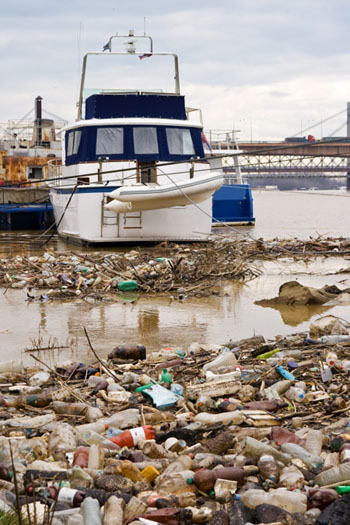To tend and to keep
Scientists believe the world's largest garbage dump isn't on land – it is The Great Pacific Garbage Patch – a sprawling mass of waste estimated to be 90% plastic reaching a depth of 90 feet. It is a floating raft of debris that is now sprawling from the coast of California to the coast of Japan, and estimated to be twice the size of Texas!
This shocking reality was aired during a segment on the Oprah Winfrey Show on April 22, 2009. The segment stated that "Marine biologists estimate that about 80 percent of the litter is from land, either dumped directly into waterways or blown into rivers and streams from states as far away as Iowa."

This swirling, floating trash heap is affecting marine life, as creatures such as Killer and Beluga whales, sea otters, fish and birds ingest waste to the detriment of their health. The show featured Fabien Cousteau, grandson of famed undersea explorer Jacques Cousteau. He commented that "this pollution will eventually come back to haunt humans and find its way onto our dinner plates" as the garbage and pesticides we use run off into the waterways and eventually the oceans, ending up "in the food chain, which ends up back on our plates."
Mankind's methods and mistakes are the culprits in the disruption and destruction of the water which comprises 70 percent of the earth's surface.
According to an Encyclopedia of Earth article titled Oil Spills, "The primary source of accidental oil input into seas is associated with oil transportation by tankers and pipelines (about 70%)."
From the 1967 accidental spillage of 100,000 tons of crude oil by the Torrey Canyon supertanker, which caused major ecological damage off French and British shores and great damage to fish hatcheries, to the more recent and high profile Exxon Valdez spill in Prince William Sound, Alaska in 1989, which created serious environmental harm to the delicate Arctic system, man has done much to destroy the very waters that provide his sustenance.
The article furthermore states that "Marshes and sediments in Prince William Sound in Alaska retained oil from the massive oil spill of the Exxon Valdez… for many years, affecting the development of fish embryos on the bottom. After ten years, pockets of oil remained in these marshes."
The article continues, saying "remedial actions after oil spills are controversial, and some of the cures (e.g. aggressive cleaning with large heavy equipment) may be worse than the original problem."
So, mankind's industrialized methods and mistakes have generated lasting detrimental effects. In the Bible we see what man was told at the very beginning concerning how the earth was to be treated: "Then the Lord God took the man and put him in the Garden of Eden to tend and keep it" (Genesis 2:15).
The first man Adam and his wife Eve, rejecting God's command and taking of the Tree of the Knowledge of Good and Evil, were cast out of the Garden. From this point forward, mankind has made his own decisions regarding the care of the earth, or the lack thereof.
Adam was originally told to tend and to keep the garden, and that command was to extend to all humanity and throughout the whole world.
Man continues to reject God's command to tend and keep the earth, including the waters of the seas, and we are reaping the results of our actions – mountains of waste filling the waters and environmental disasters unprecedented in human history.
To learn about a time when the knowledge of God will fill the earth as the waters cover the sea, and to envision life as it should and can be, request our free booklet, "The World Ahead: What Will It Be Like?".
Stay up to date with our Weekly Digest Email!
Tomorrow's World ComMentary Podcast
Subscribe to Tomorrow's World Commentary podcasts on iTunes and Google Play!



